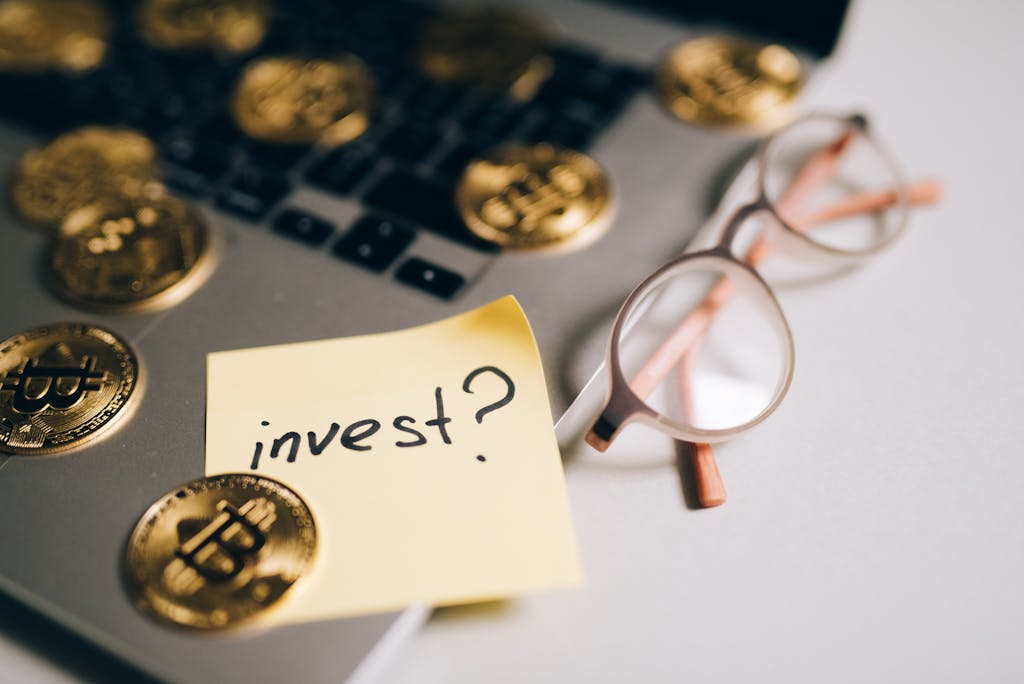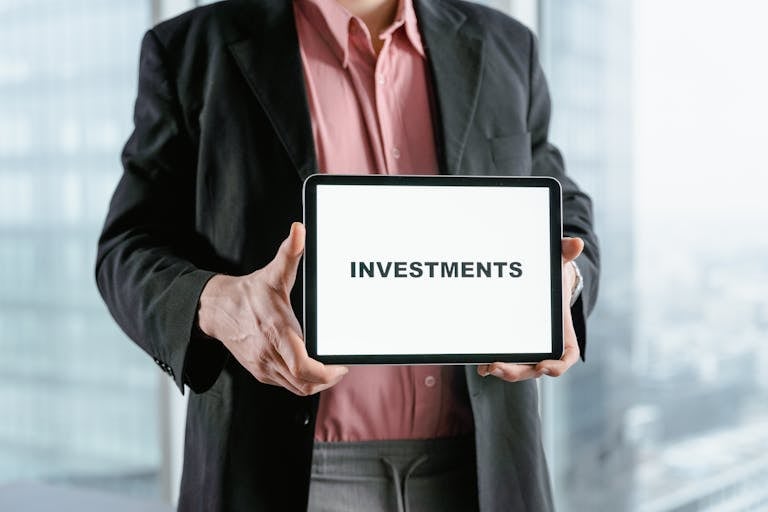Why Invest?

“What if your money could work while you sleep?”
This question might sound like a lofty dream, but it’s one of the powerful realities of investing.
It’s not a dream—it’s a reality for millions of people who’ve discovered the power of investing.
The beauty of investing isn’t just in growing your wealth; it’s in the doors it opens—doors to financial independence, stability, and the freedom to live life on your terms.
For most of us, the daily grind of earning and spending feels like an endless loop. But what if there was a way to escape that cycle?
A way to grow your wealth, protect your future, and achieve the goals you’ve always dreamed of?
Whether you’re dreaming of financial freedom, a cushy retirement, or just making your 9-to-5 optional, the answer to all of it starts with one question—‘Why invest?’ But here’s the thing—it’s not just about making more money.
It’s about building a future where your time, energy, and passions belong to you, not your paycheck.”
It’s also not just a financial strategy—it’s a mindset, a lifestyle, and a tool that opens doors to opportunities you might have thought were out of reach.
Therefore in this post, we’re diving into why investing matters, how it transforms your financial outlook, and why you don’t have to be an expert or wall street pro—or rich—to get started.
It’s for everyone, including you.
So, let’s explore: Why invest? Because the journey to financial independence begins with that simple question.
But before we begin let me share a little secret. This wasn’t something I always understood.
Like many people, I stumbled into the world of investing before I truly grasped its significance. Let me take you back to where my journey began.
My First Investment: A Step I Didn’t Even Understand
In 2008, I was 23 years old and working in the bank. It was during this time that I made my very first investment—though, to be honest, I didn’t even realize it was an investment at the time.
As an employee working in the bank at the end of the year every employee got something called Profit Sharing benefits which refers to a program or system where a portion of the bank’s profits is distributed to its employees or stakeholders.
This is typically done as an incentive to reward employees for their contribution to the bank’s profitable success.
However the profit sharing was usually split into two parts and was given in the form of a portion of it in cash payments along with a part portion in the form of bank shares with the bank.
It was a mandatory policy, and while I received these shares after my first year working in the bank, I didn’t truly understand what owning shares or stock meant. It felt more like an automatic process than a deliberate financial decision.
But here’s the surprising part: even though I was working at a financial institution, I was not educated about investing or the stock market.
I didn’t even understand how these shares could grow over time or the potential they held. I simply accepted them because that’s how the system worked.
However looking back now, I now see how much I could have gained if I’d been equipped with the knowledge I have today.
A Turning Point: Discovering the Financial Markets
Fast forward nearly a decade to 2017. By this time, I was 33 years old and had left my job at the bank.
It was during this period that I was introduced to trading the financial markets. For the first time, I began to truly educate myself about investing and trading.
It was like a whole new world opened up to me. I started learning about stocks, bonds, trading strategies, and how the markets really worked.
I began to see investing not just as something wealthy people did but as a tool that anyone, including me, could use to build financial stability and freedom.
This education was a game-changer. It made me realize just how much potential I had missed with my earlier investments.
If only I had understood back in 2008 what I know now, I could have leveraged those shares and grown my portfolio exponentially.
Why This Matters to Me (and to You)
That realization ignited a passion in me—a passion to help others understand the importance of investing and to equip them with the knowledge I didn’t have back then.
I don’t want anyone to look back and think, “If only I had started earlier” or “If only I had known better.” That is not the mindset. It is about what we know now.
Investing isn’t just about making money. It’s about creating options and opportunities. It’s about having the freedom to retire comfortably, pursue your dreams, and provide for your family without stress.
And the truth is, it’s never too early or too late to start.
What Does It Mean to Invest?
Let’s break it down in the simplest terms. Investing simply means putting your money into something—like stocks, real estate, or a business—with the goal of earning more money over time.
Think of it like planting a seed. With a little patience and care, that seed can grow into a thriving tree that bears fruit for years to come.
But here’s the best part: investing isn’t just for experts with insider knowledge. Thanks to technology and resources available today, anyone can start—even if you’re working with a small budget.
Why Should You Start Investing?
There are some reasons you should start investing sooner than later.

1. Your Money Loses Value Over Time Without It
You’ve probably noticed that things are getting more expensive. A gallon of milk, a loaf of bread, or even a movie ticket costs more today than it did a decade ago.
That’s inflation at work—it’s the steady rise in the cost of goods and services over time.
Here’s the kicker: if your money is sitting idle in a savings account with a low-interest rate, it’s actually losing value every year because it can’t keep up with inflation.
Imagine saving $10,000 today, only to find out it buys you much less in 10 years.
Investing combats this. By putting your money into assets like stocks, real estate, or mutual funds that grow over time, you’re not just keeping up with inflation—you’re staying ahead of it.
It’s like planting a seed that not only grows into a tree but produces fruit year after year.
What costs $10 today might cost $15 in a few years. Investing helps your money grow at a rate that keeps up with, or even beats, inflation.
2. It Helps You Build Wealth and Achieve Financial Freedom
Let’s talk about what financial freedom really means. It’s not just having money in the bank; it’s having the option to live life on your terms.
It’s the ability to choose whether you want to work, take a year off to travel, or retire early and spend more time with your family.
Investing is the bridge between where you are now and the life you want to build. It allows you to create multiple streams of income, so you’re not relying solely on your paycheck.
Imagine earning dividends from stocks, rental income from real estate, or profits from a small business you’ve invested in.
The best part? The earlier you start, the more time your money has to grow. Thanks to the power of compound interest, even small investments today can snowball into significant wealth over the years.
That’s what financial freedom feels like, and investing is a major stepping stone toward achieving it.
3. It Helps safeguard You for the Unexpected
Life is unpredictable, and having investments can give you a financial safety net when you need it most.
Life has a way of throwing us curveballs. An unexpected medical bill, a job loss, a career change, or an emergency repair can wreak havoc on your finances if you’re not prepared. While an emergency savings fund is a great start, investing adds another layer of protection.
Investments like stocks and bonds can serve as a financial cushion. They’re assets you can tap into if life takes an unexpected turn.
Plus, having investments gives you peace of mind knowing that you’re building a safety net for your family and yourself.
Think of it as an umbrella for rainy days. It might not stop the storm, but it’ll keep you covered when you need it most.
And that is the benefit of investments it can help you navigate these life’s twists and turns.
4. It Can Help You Fund Your Dreams
What’s something you’ve always wanted to do but thought was out of reach? Maybe it’s starting your own business, traveling the world or giving generously to causes you care about or supporting a cause close to your heart.
Investing gives you the financial freedom to turn those dreams into reality. It’s not about working harder; it’s about letting your money work smarter.
For example, let’s say you want to travel the world. By investing consistently, you could grow a travel fund over time without putting a strain on your monthly budget.
Or if you’re passionate about helping others, your investments could provide the financial means to give generously to charities and causes you care about.
Investing isn’t just about numbers on a spreadsheet—it’s about living a life filled with purpose and possibility.
Investing can help you create the financial margin to fund those dreams without sacrificing your day-to-day needs.
5. It Multiplies Your Money
We can’t talk about investing without mentioning the magic of compound interest.
Here’s how it works: when you invest, your money earns returns. Then those returns start earning returns of their own.
Over time, this snowball effect creates exponential growth.
Let’s break it down:
Imagine you invest $1,000 at a 7% annual return. After one year, you’d have $1,070. The next year, you’re not just earning on your initial $1,000—you’re earning on the $1,070.
Fast forward 20 or 30 years, and you’ll see how even small amounts can grow into something substantial.
The takeaway? The earlier you start, the more time you have to let compound interest work its magic.
Lessons from My Journey
My experience with investing taught me a few valuable lessons that I want to share with you:
1. Start Where You Are
You don’t need to be an expert or have a large sum of money to begin investing. If your first step is receiving shares from an employer or setting aside a small amount each month, that’s still a step in the right direction.
2. Education is Key
Working at a bank didn’t automatically make me financially literate about investing. It took intentional learning—books, courses, and mentorships—for me to truly understand how to make my money work for me.
3. Time is Your Best Friend
The earlier you start, the more time you have to let your investments grow. Even small amounts invested consistently can lead to significant wealth over time, thanks to compound interest.
4. It’s Never Too Late
Even though I started my serious investing journey at 33, I’ve made incredible progress by staying consistent and committed to my goals.
How to Start Investing
If the idea of investing feels overwhelming, you’re not alone. Many people worry about making mistakes or losing money.
But here’s the good news: you don’t have to be an expert to get started.
Starting doesn’t have to be complicated. Here are a few simple steps to set you on the right path:
1. Set Clear Goals: What are you investing for? A home, retirement, or simply growing your wealth?
2. Educate Yourself: Learn the basics about different investment options—stocks, bonds, real estate, mutual funds, and more.
There are countless free resources—books, podcasts, and videos—that can help you build your knowledge.
3. Start Small: You don’t need a fortune to begin. Many investment platforms let you start with as little as $5.
4. Be Consistent: Make investing a habit, whether that’s monthly contributions to your retirement account or buying shares regularly.
5. Be Patient: Investing is a long-term game. The market may have ups and downs, but staying the course usually pays off in the end.
The Power of Starting Today
The earlier you start investing, the more time your money has to grow.
Thanks to the magic of compound interest, even small amounts invested today can grow into significant sums over time.
For example, if you invest $100 a month at an average return of 8%, you could have over $150,000 in 30 years.
What’s Stopping You?
Maybe you’re hesitant because you’re worried about making mistakes or think you need a financial degree to succeed.
Here’s the good news: you don’t need to have it all figured out.
Start small, keep learning, and remember that every investor, even the most successful ones, started somewhere.
Investing isn’t just about money; it’s about building a life where your goals, dreams, and passions take center stage. So, why invest? Because your future self will thank you for it.
Ready to plant that seed? The best time to start was yesterday, but the second-best time is today. Let’s grow!
Why Invest? A Better Future Awaits
Investing has transformed the way I view money and life. Today, I’m more confident, more secure, and more determined to help others take that first step.
I know firsthand how intimidating it can feel to start when you don’t fully understand the process, but I also know how rewarding it is to look back and see the progress made.
So, why invest? Because the life you want—the freedom, the stability, the opportunities—is waiting for you. And the sooner you start, the closer you’ll get to making it a reality.
Remember, every expert investor started as a beginner. Let’s grow together.
Final Thoughts: Why Invest?
At its core, investing is about empowerment. It’s about taking control of your financial future and building a life filled with opportunities, security, and joy.
So, why invest? Because your future self will thank you.
The dreams you have today—the home you want to buy, the trips you want to take, the impact you want to make—can all become realities when you start planting those seeds now.
The best part? You don’t have to do it alone. There’s a whole world of resources and support to help you along the way.
So, what are you waiting for?






